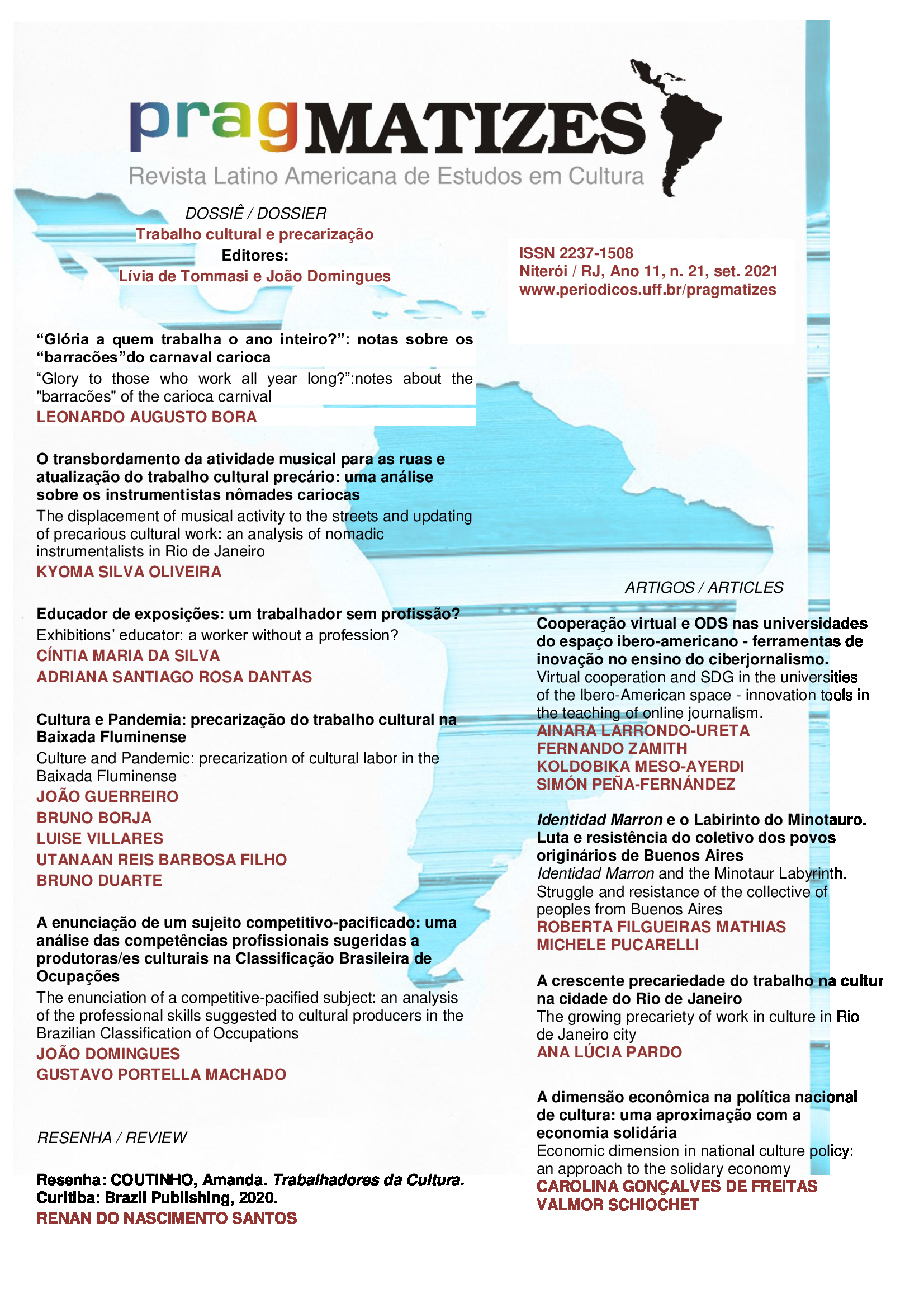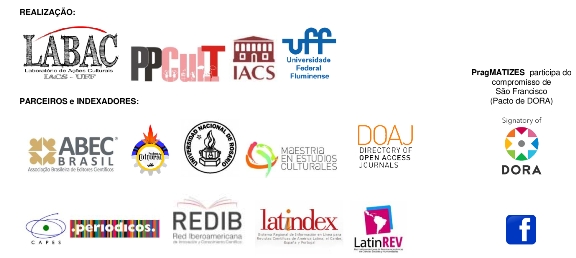Identidad Marron and the myth of the labyrinth.
Struggle and resistance of the collective of peoples from Buenos Aires
DOI:
https://doi.org/10.22409/pragmatizes.v11i21.48251Keywords:
precarious work, globalization, political and cultural collectives, indigenous peoples, Latin AmericaAbstract
At a time when both the identity agenda and intersectionality are debated by various sciences and in different academic spaces, we seek in this article to present a case study on the performance of the Colectivo Identidad Marron, which dialogues not only with precariousness (constant in our continent), but with possible culturally inventive and powerful solutions. Formed in 2018 in the city of Buenos Aires, Identidad Marron is composed mainly of women struggling for an insertion of native peoples in better jobs and for prominent spaces in their artistic activities. We intend to reflect on whether their co-option and performance in the precarious system does not re-signify their insertion, managing to give greater visibility to the issues of identity movements in Argentina. As part of a broader context of identity movements, which guide Latin American and world thinking, Identidad Marron can be understood as an example of struggle and resistance when using the facilities of globalization to its benefit, even though they are aware of the overwhelming limitations imposed by the neoliberal economic agendas of large Western cities. Thus, we understand that their clashes are like an update of the myth of the Minotaur's labyrinth. Although they remain inside the labyrinth, they do it together and without fighting for fairer and more equal spaces. Thus, in addition to presenting its performance, we will work and reflect with data that denounce the increase in social inequalities in these territories at the same time that we suggest that these new identity movements have a strong trace of reactivation of local political and social movements that emerged in the decades and affection from the remembrance of their ancestry. Far from looking at the past as a place of arrival, it is the updates of these processes that make these movements more significant, led, in general, by women who are crossed by intersectional issues.
Key-Words: precarious work, globalization, political and cultural collectives, indigenous peoples, Latin America
Downloads
References
ANTUNES, Ricardo. O Privilégio da Servidão. O Novo Proletariado de Serviços na Era Digital. Rio de Janeiro: Boitempo, 2018.
ANTUNES, Ricardo. Trabalho e precarização numa ordem neoliberal. In: GENTILI, Pablo; FRIGOTTO, Gaudêncio (orgs.). La Ciudadania Negada. Políticas de Exclusión en la Educación y el Trabajo. Buenos Aires: CLACSO, 2000. p. 35-48
ANZALDÚA, Glória La conciencia de la mestiza - rumo a uma nova consciência Rev. Estud. Fem., Florianópolis, v. 13, n. 3, set./dez. 2005. [Sessão Debate, não paginado]
CEPAL - Comissão Econômica para América Latina e Caribe. Disponível em: https://www.cepal.org/es/comunicados/periodo-2014-2020-seria-menor-crecimiento-economias-america-latina-caribe-ultimas-siete. Acesso em: 29 dez. 2020.
CHACEL Lucas, Globalização fracassou para muitos, e reações podem ser violentas. CANZIAN, Fernando. Folha de São Paulo, 22 jul. 2019 às 12h00. Disponível em: https://temas.folha.uol.com.br/desigualdade-global/europa/globalizacao-fracassou-para-muitos-e-reacoes-podem-ser-violentas.shtml. Acesso em: 28 abr. 2020.
COLLINS, Patricia Hill; BILGE, Sirma. Interseccionalidade. São Paulo: Boitempo, 2021.
COLOMBO, Sylvia. Buenos Aires deixou ainda mais evidentes suas desigualdades durante a pandemia. São Paulo. Folha de São Paulo, 26 de dezembro de 2020. Disponível em: https://www1.folha.uol.com.br/mundo/2020/12/depoimento-buenos-aires-deixou-ainda-mais-evidentes-suas-desigualdades-durante-a-pandemia.shtml?utm_source=whatsapp&utm_medium=social&utm_campaign=compwa. Acesso em: 29 dez. 2020.
COLOMBO, Sylvia. Vulneráveis, empregadas domésticas da América Latina sofrem na pandemia. São Paulo. Folha de São Paulo, 10 maio 2020. Disponível em: https://www1.folha.uol.com.br/colunas/sylvia-colombo/2020/05/vulneraveis-empregadas-domesticas-da-america-latina-sofrem-na-pandemia.shtml. Acesso em: 10 maio 2020.
DAVIS, Ângela. Mulheres, Raça e Classe. São Paulo: Boitempo, 2016.
ESPINOSA-MIÑOSO, Yuderkys. Una crítica descolonial a laepistemología feminista crítica El Cotidiano, núm. 184, p. 7-12, marzo-abril, 2014.
GALEANO, Eduardo. A caminho de uma sociedade da incomunicação? In: MORAES, Dênis de (org.). Sociedade midiatizada. Rio de Janeiro: Mauad X, 2006.
GORELIK, Adrián; PEIXOTO Fernanda Areas. Ciudades sudamericanas como arenas culturales: Artes y medios, barrios de élite y villas miseria, intelectuales y urbanistas: cómo ciudad y cultura se activan mutuamente. Madrid: Siglo XXI Editores, 2019.
IDENTIDAD MARRON. https://www.facebook.com/identidadmarron/. Acesso em: 3 maio 2021.
MARTÍN-BARBERO, Jesus. Tecnicidade, identidades, alteridades: mudanças e opacidades da comunicação no novo século. In: MORAES, Dênis de (org.). Sociedade Midiatizada. Rio de Janeiro: Ed Mauad X, 2006.
MBEMBE, Achille. Necropolítica. São Paulo: N-1 Edições, 2018.
MITO DO LABIRINTO. Disponível em: http://www.projetominotauro.com.br/o-mito-do-minotauro/. Acesso em: 22 dez. 2020.
MORSE, Richard. Cidades e Cultura Política nas Américas. Belo Horizonte: Editora UFMG; 2017.
PAIXÃO, Fernanda; FERREIRA, Antônio Coletivo Passarinho. Buenos Aires, 13 agosto 2018. Disponível em: www.brasildefato.com.br/2018/08/13/nada-sera-como-antes-uma-radiografia-do-8-de-aborto-e-da-mare-verde-na-argentina/. Acesso em: 01 jan. 2020.
REDAÇÃO. São Paulo, 30 dezembro 2020. Disponível em: https://veja.abril.com.br/mundo/congresso-da-argentina-aprova-legalizacao-do-aborto/. Acesso em: 01 jan. 2020.
SIMON, Roberto. A ordem global numa máquina do tempo. Folha de São Paulo, 09 maio de 2020. Disponível em: https://www1.folha.uol.com.br/colunas/roberto-simon/2020/05/a-ordem-global-numa-maquina-do-tempo.shtml. Acesso em: 10 maio 2020.
Published
How to Cite
Issue
Section
License

This work is licensed under a Creative Commons Attribution 4.0 International License.
By forwarding an original to PragMATIZES, the authors agree that the copyright related to it is transferred to the Publishing. Articles and other writings are made available in PDF format from their publication, and they can be downloaded to institutional repositories and personal pages, provided that with their proper bibliographic indication.



